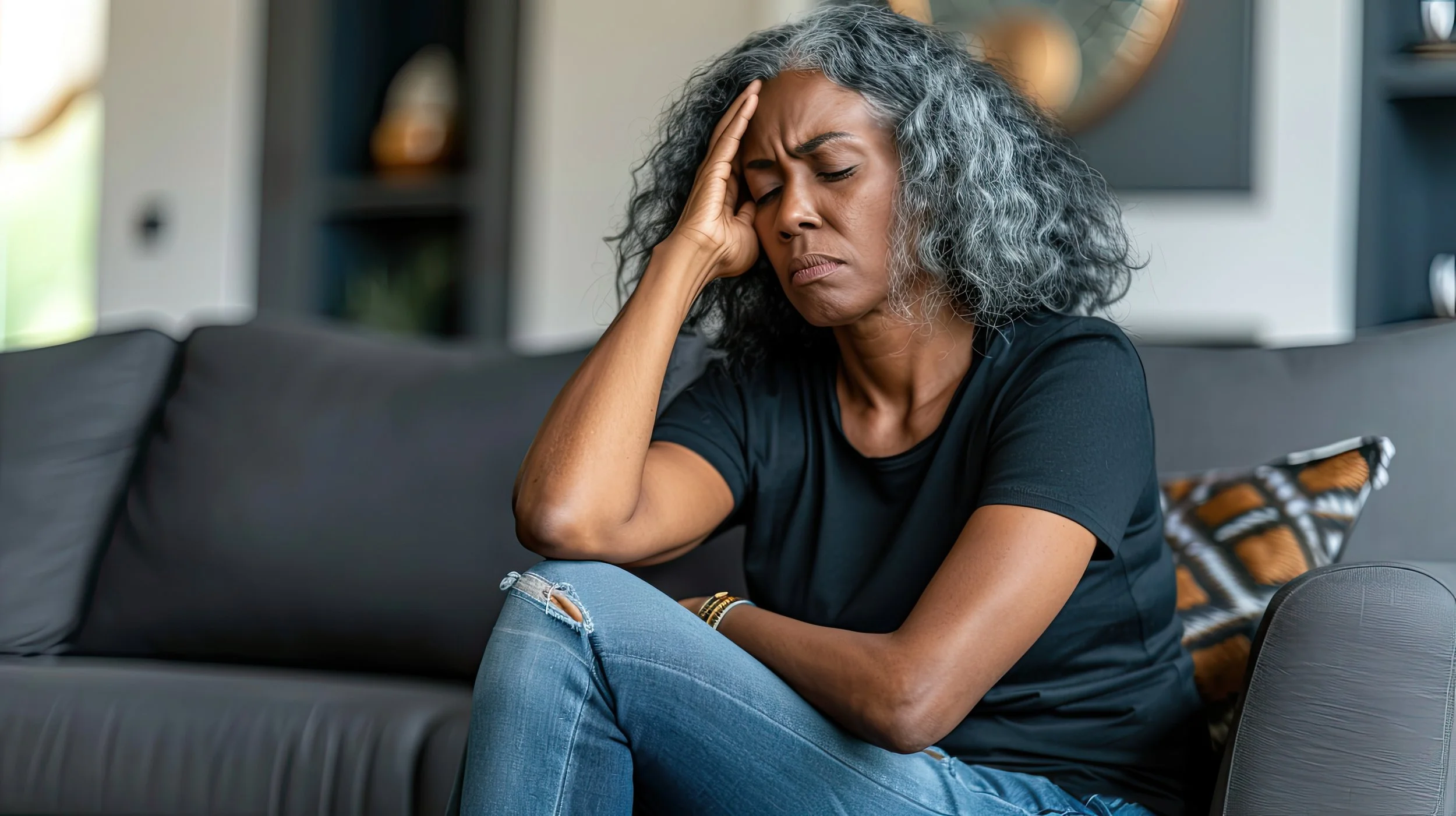The Menopause Symptom No One Talks About: That Sudden Feeling of Doom
Have you ever felt a sudden wave of panic or dread wash over you out of nowhere? Your heart races, your chest tightens, and you feel sure that something terrible is about to happen. But nothing is wrong. You’re safe. And still, the feeling is very real.
If you’re a woman in your forties or fifties and going through perimenopause or menopause, this intense sense of doom might be a symptom no one warned you about. You’re not alone, and you’re definitely not imagining it.
What Is the Doom Feeling in Menopause?
The menopause doom feeling is best described as a sudden, intense wave of fear, panic or dread that seems to come from nowhere. One minute you’re going about your day, and the next you feel completely overwhelmed by a sense that something terrible is going to happen. There’s no clear reason, no obvious trigger just a gut-level feeling that something is very wrong.
It can make your heart race, your chest tighten, and your breathing feel shallow. You might feel sick, dizzy, or like you're about to burst into tears. Some women describe it as a full-body alarm – like your nervous system is sounding the panic button, even when there’s no real danger.
Many women say it feels like a sense of doom, as if something awful is looming just around the corner, even when everything in their life seems perfectly fine. It can be very physical and very convincing. And for women who have never experienced anxiety before, it can be incredibly frightening. You might question whether you’re having a heart attack, developing a mental health condition, or losing control.
One of the hardest parts is that it’s so difficult to explain to others. Even those close to you might not understand it – because there’s no visible cause. But it is real, and if it’s happening to you, it deserves to be acknowledged and addressed.
Why Does Menopause Trigger This Feeling?
This sudden, unexplained fear isn’t just in your head. It’s happening because of the powerful hormonal shifts your body is navigating.
During perimenopause and menopause, oestrogen levels begin to decline – sometimes gradually, sometimes erratically. Oestrogen doesn’t just affect your reproductive system. It plays a huge role in your brain chemistry and emotional regulation.
In particular, oestrogen influences the production of two key neurotransmitters:
Serotonin, which affects your mood, sleep, and overall sense of wellbeing
GABA, your brain’s natural calming chemical that helps you stay relaxed and grounded
When oestrogen drops, so do these feel-good brain chemicals. That means your brain becomes more vulnerable to anxiety, irritability, low mood – and those sudden waves of dread or doom.
But it doesn’t stop there. During menopause, your stress hormone cortisol can also become more erratic. You might become more sensitive to stress or find it harder to bounce back after emotional upsets. When cortisol is high and calming neurotransmitters are low, your body is primed for a fight-or-flight response – even when there’s no real threat.
Poor sleep, night sweats, and blood sugar fluctuations (which are also common during menopause) can all intensify this response. Your body becomes more reactive, your brain less resilient, and your emotional state more fragile.
It’s a perfect storm for anxiety. But understanding what’s going on inside your body is the first step to feeling back in control.
Real Symptoms, Not Just in Your Head
As a nutritional therapist specialising in women’s health, I see this all the time in clinic. Women who have never experienced anxiety in their lives suddenly feel anxious, teary, or full of dread. Some even worry they are developing a serious mental health condition.
This is not weakness. This is your brain responding to hormonal chaos. Understanding this can be a huge relief.
How to Cope With the Doom Feeling During Menopause
You do not have to live in fear of this feeling. Here are some practical, evidence-based ways to help calm your nervous system and reduce anxiety naturally:
1. Balance Your Blood Sugar
Keep meals regular and avoid skipping meals. Include protein, healthy fats, and fibre with every meal. Avoid sugary snacks and caffeine spikes which can worsen anxiety symptoms.
2. Breathe Deeply
Practise deep breathing techniques that calm the parasympathetic nervous system. Try box breathing or the 4-7-8 method when the feeling comes on.
3. Move Your Body
Gentle daily movement like walking, yoga, or stretching helps regulate stress hormones and boosts mood.
4. Get Enough Magnesium
Magnesium is known as nature’s tranquilliser. It supports GABA function and helps you feel calm. Foods high in magnesium include leafy greens, pumpkin seeds, and dark chocolate.
5. Cut Back on Stimulants
Too much caffeine or alcohol can overstimulate the nervous system. Try swapping your morning coffee for a calming herbal tea if you are struggling with anxiety.
6. Try Targeted Supplements
B vitamins, magnesium glycinate, ashwagandha, and L-theanine can be helpful, but always consult a qualified practitioner for personalised advice.
7. Seek Connection and Support
Talking to someone you trust or working with a menopause specialist can help you feel more in control. Cognitive behavioural therapy (CBT) can be highly effective for managing anxiety too.
When to Speak to Your Doctor
If this feeling becomes persistent, affects your daily life, or comes with other symptoms like chest pain, intrusive thoughts, or severe mood changes, do not hesitate to contact your GP. You deserve to feel safe and supported.
The doom feeling can be one of the most unsettling symptoms of menopause, especially because it often strikes without warning. But there is nothing wrong with you. This is a symptom caused by chemical changes in your body. And with the right support, it can be managed.
You are not broken. You are going through a powerful transition. And you do not have to do it alone.
Looking for real support that works?
My new book Have a Magnificent Menopause: A Straightforward Guide to Looking Good and Feeling Great launches on 4th August, but you can pre-order your Kindle version now for an amazing price.
It’s packed with practical, evidence-based strategies to help you feel calm, clear, and confident again — even through the toughest menopause symptoms.
Pre-order now — link below





